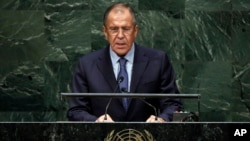As Russia continues to deny military involvement in Ukraine, it appeared to be fighting an image war last week at the United Nations - in what has become an annual exercise in condemning Nazism and racism.
For about a decade, the U.N. General Assembly committee that deals with human rights has voted each year on a Russian-drafted resolution condemning the glorification of Nazism and Neo-Nazism and all forms of racism, xenophobia and intolerance.
The non-binding resolution receives wide-support - this year 115 countries voted in favor of it - while the United States and Canada traditionally vote against it and the European Union countries abstain.
Russian diplomats and news media were quick to play up the fact that Ukraine joined the United States and Canada as the only countries voting against the measure this year. Fifty-five nations abstained.
One headline on the Russia Today website warned “Ukrainian Neo-Nazism Threatens to Spread Across Europe." Itar-Tass singled out the three no-voting countries in its coverage of a U.N. vote that drew virtually zero international media attention.
Nina Khrushcheva, an associate professor of international affairs at New York’s New School, said Moscow is using this annual resolution as domestic propaganda, hoping an international platform will make its argument even stronger.
“They absolutely care about their image. But this particular resolution is not going to really improve the image, because the image is bad.” She added, “You [can] condemn Nazism all you want - but what kind of Nazism are you condemning? And where exactly and who is exactly glorifying Nazis today?”
Russia has portrayed Ukrainian groups, such as Right Sector and UNA-UNSO [Ukrainian National Assembly - Ukrainian People's Self-Defense] as neo-Nazi groups, and the crisis in Ukraine hung over the committee’s proceedings.
The United States, which annually rejects the resolution for reasons including language that could be interpreted to limit free speech and assembly, this year also expressed “alarm” over Russia’s “recent efforts to vilify others by loosely using terms such as “Nazi or “Fascist."
U.S. representative Terri Robl told the session “the government of Russia has employed this rhetoric during the current crisis in Ukraine, including against the current Ukrainian government.”
Ukraine’s representative said his government is “against this cynical attempt of the Russian Federation to present itself as a champion of combating Nazism and neo-Nazism while repeating those same crimes against my nation.”
He also noted that Ukrainians equally condemn Hitler and Stalin as international criminals.
The European Union says its members strongly oppose Nazism and racism, but that the resolution is too restrictive on freedom of expression and assembly. The European Union also says the resolution ignores other racist and totalitarian ideologies.
This year, the European Union says, its members are concerned that Russia is using the goal of fighting neo-Nazism as a pretext to cover the “the illegal annexation of a part of a sovereign State." Russia annexed Ukraine's Crimea region in March.
Khrushcheva noted that the problem is not really with the resolution, which had wide international backing, but with the fact that Russia uses these exercises for its own political purposes.
“It is not because they are so against glorification of the Nazi ideology, it is just because in this particular case it serves their own purpose, because they do need to brand Ukraine - the Kyiv government, or some actions of the Kyiv government, or some affiliation of the Kyiv government - as the sort of branch of the Nazi ideology,” she said.
Russia’s foreign ministry said it was “extremely regrettable” that there were “no” votes and abstentions on the resolution.
